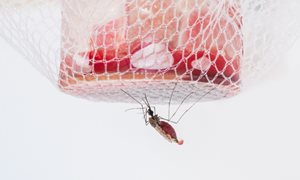
A professor of 'Outbreaks of infectious diseases' sounds logical now that coronavirus SARS-CoV-2 has had the world in its grip for over a year. But the plans for this chair date back to before that time. Just appointed professor Chantal Bleeker-Rovers: "We must be prepared for more outbreaks of viruses and bacteria."
You become the first professor in the Netherlands with this chair. The timing couldn't be better.
"That’s right. I've been dealing with infectious disease outbreaks for my entire career in both healthcare and research. The deadline for submitting the plan was early March 2020, just before the virus outbreak. The past year has shown how important it is to have a solid base for research on infectious disease outbreaks."
You are an expert on Q fever, an infection we also know from major outbreaks. What are differences between and similarities with COVID-19?
"COVID-19 is caused by a virus, Q fever on the other hand is a bacterial infection. They are both zoonoses, which means that the virus or bacteria is transmitted from animals to humans. In the case of Q fever, this mainly involves goats and sheep. People become infected by inhaling the bacteria, but unlike SARS-CoV-2, it is not transmissible from person to person. A similarity between COVID-19 and Q fever is that both infections manifest themselves in humans in different ways, ranging from no symptoms or barely sick, to being seriously ill or even dying. And with both infections, a proportion of people retain long-term symptoms, including severe fatigue, without being able to demonstrate the causative agent itself."
What questions surrounding Q fever are you looking into?
"We had a very large outbreak in the Netherlands where the epicenter was close to Nijmegen, in Herpen. So we saw a lot of patients. Logical clinical research questions followed: how do you recognize the infection, which patients get complications, how do you treat the patients and what are the possible long-term consequences for patients?"
"We also do immunological research: why become some people very sick, and others not? Some Q fever patients get chronic Q fever, where the bacteria just won't leave the body, and some get Q fever fatigue syndrome. The infection is gone, but people continue to have symptoms, such as fatigue and difficulty concentrating, for a long time. We are conducting research into the possible cause of these long-term symptoms, and looking for an effective treatment."
Can you give examples of research?
"Due to earlier research we did on imaging in infections, the PET scan is now in use worldwide for long-term, chronic Q fever. This is because it is difficult to diagnose. Using a PET scan, we can see whether people have an infection of the heart valve or a dilated blood vessel due to Q fever. And with COVID-19, we investigated whether the CT scan could be of help. Another example is that we are now using the results of a study we did earlier on cognitive behavioral therapy in people with Q fever fatigue syndrome to investigate long-term COVID-19 symptoms."
"Of course, we are also looking at whether current COVID-19 research is applicable to Q fever. We hear rumors that in patients with long-term COVID-19 symptoms, the symptoms decrease after vaccination. If this is really the case, we may also be able to vaccinate people with Q fever fatigue syndrome with the Q fever vaccine, which has so far only been approved in Australia. You see: a lot of the knowledge we're gaining is potentially applicable to different diseases."
What did you learn in the past year?
"How important it is to be well prepared. That the preparedness plans are ready. My chair is about outbreak preparedness and outbreak management. In the PANDEM-2 project, for example, we collaborate with the RIVM on research into the organizational side of infection outbreaks. We represent the hospitals and are investigating which critical issues you need to have in order, such as equipment, people and space. Not just in Radboud university medical center, but also on a regional, national and European level. This application was also ready before the COVID-19-outbreak. That now gives us an enormous head start. By doing, we have come much further than when we wrote the application."
Did the virus teach you anything new about viruses?
"In terms of outbreak management actually not. That may sound crazy, but I was surprised that the outbreak of the first SARS virus remained relatively small and completely extinguished. Yet there are clear differences with this variant. With the first virus, people became much sicker. People don't leave their house when they’re really ill, and for sure don’t board an airplane. The current pandemic has been able to grow so large because many people's symptoms were relatively mild. A year ago you could just travel or go to work with a mild cold.”
“But there is still a lot to learn: we still have the big questions about virus outbreaks today, so we have to keep on searching for answers through research. For example when we talk about the late effects of COVID-19 are concerned. I expect this to become a major social problem.”
Of course we can’t predict the future, but will we see major infection outbreaks more often?
"Yes I expect that will happen. About every hundred years there is a major infection outbreak, like the plague and Spanish flu in the past. The world is a lot smaller than it was fifty years ago, due to the amount of travelling involved: in the event of an outbreak you're soon falling behind. Moreover, the Netherlands is a high-risk country when it comes to outbreaks of infections. We live here with a lot of people in close proximity to a lot of animals. This certainly contributed to the fact that the Dutch Q fever outbreak was the largest ever."
What else will you be working on in the coming years?
"As professor of infectious disease outbreaks, I want the Radboud university medical center to be recognized both nationally and internationally as a center of excellence for patients with serious infectious diseases, such as Ebola, in five years' time. We are one of five centers in the Netherlands that can take care of these patients. We are building a so-called High Level Isolation Unit (HLIU, ed.) for this purpose. Together with the tuberculosis unit, it will be located on the east side of our hospital. Here we will be able to treat patients even better and safer, with fewer impact on the rest of patient care. We are now looking at how we can better guarantee the safety of our colleagues: what are the best and most user-friendly isolation materials? And how can we improve the means of communication for healthcare providers? In Ebola, for example, people wear protective clothing that makes communication difficult; that can create dangerous situations for patients and staff."
Final question. You are one of thirteen female professors now recently appointed. What does this mean to you?
I think it's especially important as an example for young researchers and physicians. They see that more and more women are top researchers and can become professors. Last year there was no female professor in the Department of Internal Medicine. Now there are three of us (new head of department Saskia Middeldorp, and Romana Netea-Maier, professor of endocrine tumors, ed.). I also set this example through my position as one of the chairmen of the Crisis Policy Team (CBT), as the first woman. That we as an organization are a good reflection of society is part of Radboud university medical center as far as I'm concerned, and I'm happy to play a role in that."
What do all those abbreviations mean?
The terms coronavirus, SARS-CoV-2, COVID-19 and long covid are often used interchangeably. This is the right way to use them:
- Coronavirus: a virus that generally causes lung and respiratory symptoms. Examples include SARS-CoV, MERS-CoV, and SARS-CoV-2.
- SARS-CoV-2: the specific coronavirus the world is dealing with in 2020 and 2021. SARS stands for severe acute respiratory syndrome and CoV for coronavirus. It is the second SARS coronavirus we have.
- COVID-19: the disease caused by SARS-CoV-2.
- Long covid: this refers to long-term effects of SARS-CoV-2. In fact, the term is incorrect because the patients who suffer from it no longer have COVID-19. The new term proposed internationally for this is PASC (Post-Acute Sequelae of SARS-CoV-2 infection).
-
Want to know more about these subjects? Click on the buttons below for more news.
More information
Pauline Dekhuijzen

wetenschaps- en persvoorlichter
Related news items

With concerted effort, tuberculosis could be eradicated in 30 years time March 24th was World Tuberculosis Day
24 March 2022 Since 2020, the number of deaths from tuberculosis increased for the first time in a decade, caused by the COVID pandemic: fewer people had access to the right care on time. Some catching up is needed. go to page
Launch of UNITE4TB partnership marks a new era in Tuberculosis treatment development
15 July 2021 The partnership will accelerate the development of new Tuberculosis (TB) drug regimens as part of the Innovative Medicines Initiative (IMI), a public-private European Research & Development Consortium go to page
Q fever antibody does not predict disease progression
6 July 2021 Joint study by Radboudumc, Jeroen Bosch Hospital and UMC Utrecht. go to page


